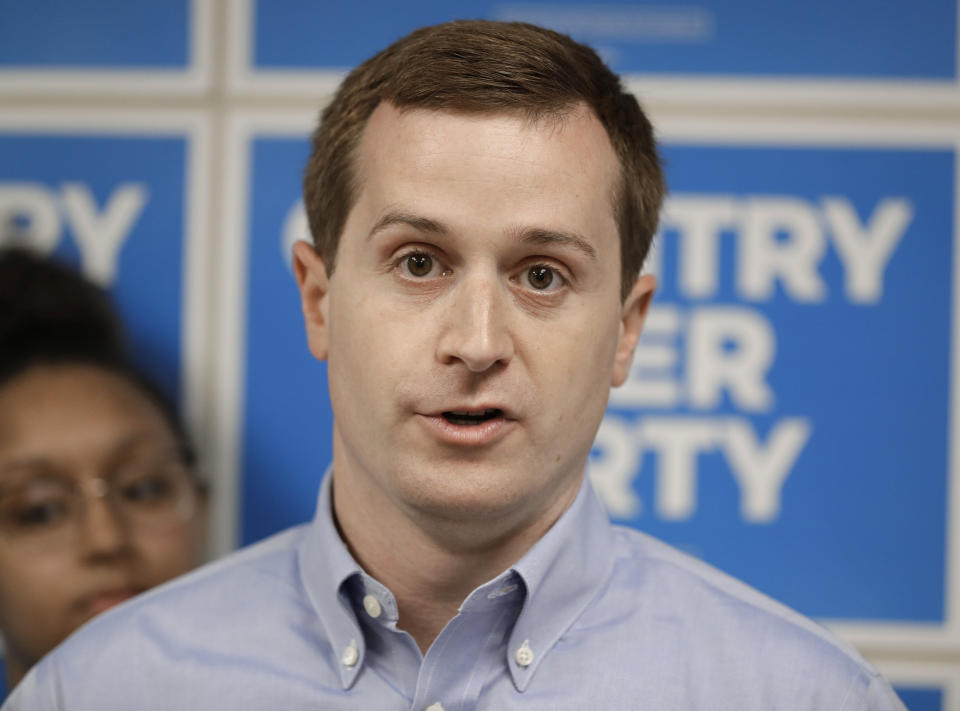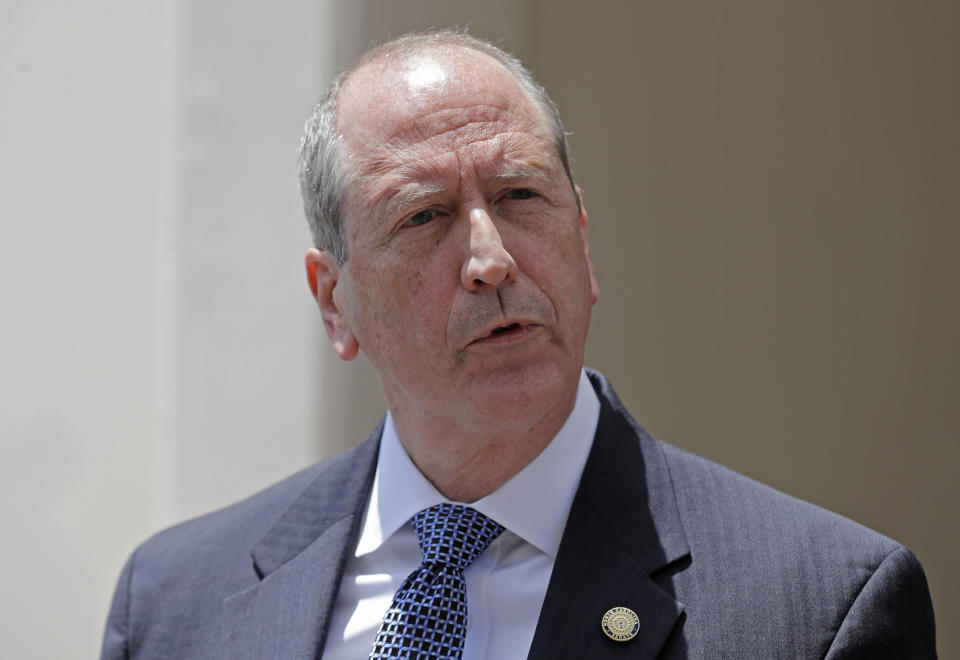N. Carolina election tests Trump clout, suburbs' GOP flight
MINT HILL, N.C. (AP) — A tossup special election in North Carolina is shaping up as a pre-2020 test of President Donald Trump's pull on voters and whether the suburbs are continuing the flight from Republicans that fueled the party's 2018 House election losses.
The House district flows eastward from the prosperous Charlotte suburbs into rural areas hugging the South Carolina border. It's up for grabs on Tuesday after state officials invalidated last November's election following allegations of voter fraud by a GOP operative.
The Democrat in that race, former Marine and Harvard MBA Dan McCready, is running again, portraying himself as a centrist who puts "country over party" and opposes impeaching Trump. His opponent, Republican state senator and attorney Dan Bishop, is a Trump loyalist who sponsored the state's now-repealed 2016 law restricting the use of bathrooms by transgender people.
Both parties are pouring resources into the state, hoping to claim a morale-boosting win to juice candidate recruitment and fundraising. But the real X-factor is Trump himself, who parachutes into Fayetteville on Monday for an election-eve rally in hopes of securing a district he won by 11 points in 2016 and that Republicans have held since 1963. With Vice President Mike Pence also campaigning for Bishop on Monday, the race is testing Trump's influence on voters and whether Democrats can sustain the momentum that powered their midterm election wins.
"This is a pretty Republican district. This is not a seat you'll be able to explain away very well" if Bishop loses, said former Rep. Tom Davis, R-Va., who once chaired the House GOP campaign committee. A defeat would mean "Republicans are in trouble in the suburbs," he said.
The contest also features other emerging national themes.
Ads from Bishop, 55, impose the faces of McCready and other favorite GOP targets, including House Speaker Nancy Pelosi and progressive firebrand Rep. Alexandria Ocasio-Cortez, atop swaying clown figures as Bishop says he'll fight "these crazy liberal clowns." A spot by McCready, 36, highlights Bishop's opposition to a bill helping ease prescription drug costs and says, "North Carolina families just can't afford politicians like Dan Bishop."
Special elections usually produce low turnout but lots of intensely partisan voters, and often don't forecast the next general election. But with Trump's national popularity stubbornly low and GOP hopes of recapturing House control hinging on suburban districts like this one, both parties see the race as a potential bellwether.
Under the microscope will be voters like Dorian DiPangrazio, 53, a real estate agent who lives in a leafy Charlotte neighborhood. Six in 10 of the district's voters live in or around the city, a major financial hub, split between Mecklenburg and Union counties and making them key battlegrounds.
DiPangrazio, who shares a name with the hurricane that battered the Carolina shores Friday and disrupted early voting, considers herself an independent. She expects to back McCready, citing his military background and work financing solar energy projects. She says Trump has "demonstrated so many negative qualities," including insulting women, and dismisses his support for Bishop because "I don't believe a word Donald Trump says, period."
Matt Haynes, a Republican from Stallings, also said he's open to McCready, citing the Democrat's background as a Marine Corps officer in Iraq and entrepreneur. McCready backs legislation helping young immigrants brought illegally to the U.S. get legal status, a contrast with Bishop's support of Trump's proposed Mexican border wall.
"My first election that I could vote was in 2000, and then I've always voted Republican. But I've said if there was a Democratic candidate that I felt like would do a better job, I would put that candidate in and ... there's a part of me that feels like McCready is that guy," Haynes said Thursday. "The only reason I haven't done early voting is I'm still praying and weighing my decision."
Democrats wrested House control from Republicans last November, capturing 39 GOP-held seats. Turnover occurred in suburban seats in blue-leaning states like California, Virginia and New Jersey, but also once-red areas surrounding cities like Dallas, Houston, Atlanta, Oklahoma City and Charleston, South Carolina. Losses among suburban women were particularly troubling for the GOP.
Now just 30% of women approve of how Trump is handling the presidency, compared to 42% of men, according to last month's Associated Press-NORC Center for Public Affairs Research poll. Also ominous for Republicans, last fall's AP VoteCast survey of more than 115,000 midterm voters nationwide showed suburban residents backed Democratic over GOP House candidates, 55% to 44%.
A McCready win or even a narrow Bishop victory could suggest that GOP hemorrhaging of voters ringing cities is continuing, even in the South.
"If we are even close in this one, that spells trouble for them in 2020," said Democratic consultant AJ Lenar, who isn't involved in the race.
Feeding GOP woes, 15 House Republicans have said they won't seek reelection next year , putting more seats at risk as they try toppling Democrats' 235-197 majority. There's also one independent and two vacancies, including a second seat along North Carolina's coast that Republicans seem likely to retain Tuesday.
Because he also sought the seat last year, McCready has enjoyed huge cash and name recognition advantages.
Besides the $6.3 million he spent for 2018, McCready reported spending $4.5 million this year, compared to $1.8 million for Bishop. But top outside GOP groups including the National Republican Congressional Committee and the Congressional Leadership Fund have unleashed over $6 million, vastly outspending their Democratic counterparts.
In an interview, Bishop attributed the close race to McCready's head start but said Trump's visit will galvanize voters "with his vision of an economy that's booming." McCready said separately that while the Charlotte area is doing well, once-bustling rural communities where many Bishop voters live and where Trump's appeal is strongest see "just empty parking spaces."
Rep. Tom Emmer, R-Minn., who heads the NRCC, the House GOP political arm, predicted a "photo finish" Bishop win and said Trump would invigorate party turnout. He conceded Bishop's name recognition struggle, saying polling showed voters who are ready to vote Republican "just don't know who that Republican is."
Bishop may not have name recognition, but he's counting on GOP base voters like Amy Ferguson turning out.
Ferguson, 29, said she backs Bishop and credited Trump's support for him.
"His administration is coming through," Ferguson said. "So, anybody that he supports, you know, as of right now, we kind of want to support, too."
Trump held a rally for Bishop in July shortly after tweeting that four House Democratic women of color should leave the country. When he began verbally attacking Rep. Ilhan Omar of Minnesota at the rally, the crowd chanted, "Send her back!"
Democrats say that even if Trump pushes Bishop to victory, it's a strategy that can't be replicated when all 435 House seats are on the ballot in 2020.
"He won't be able to go and dig into every House race across the country," said Cole Leiter, a spokesman for the Democratic Congressional Campaign Committee.
___
Fram reported from Washington.
___
Follow Emery P. Dalesio on Twitter at http://twitter.com/emerydalesio .
___
This story has been corrected to show the North Carolina city is Mecklenburg, not Mecklenberg.


